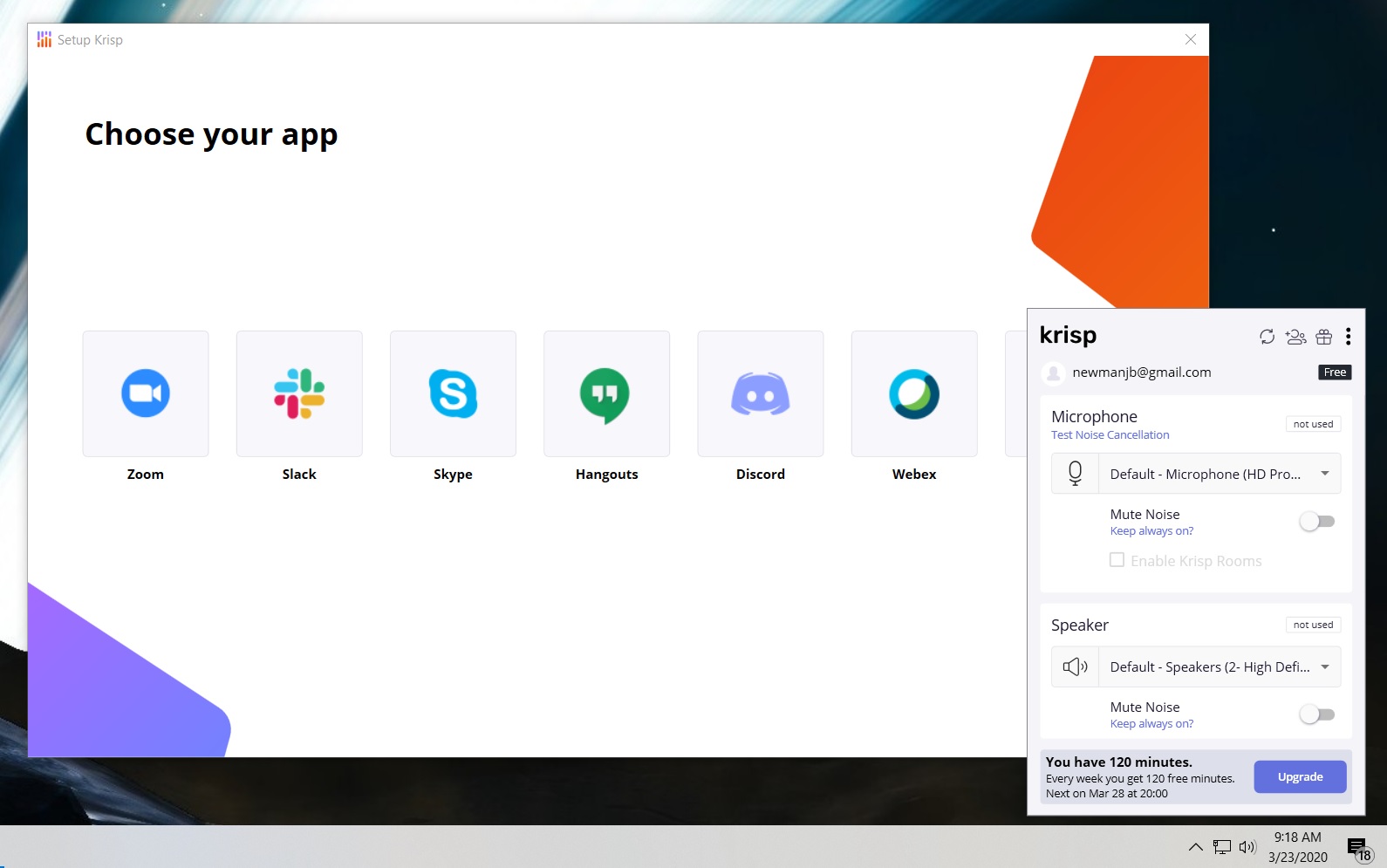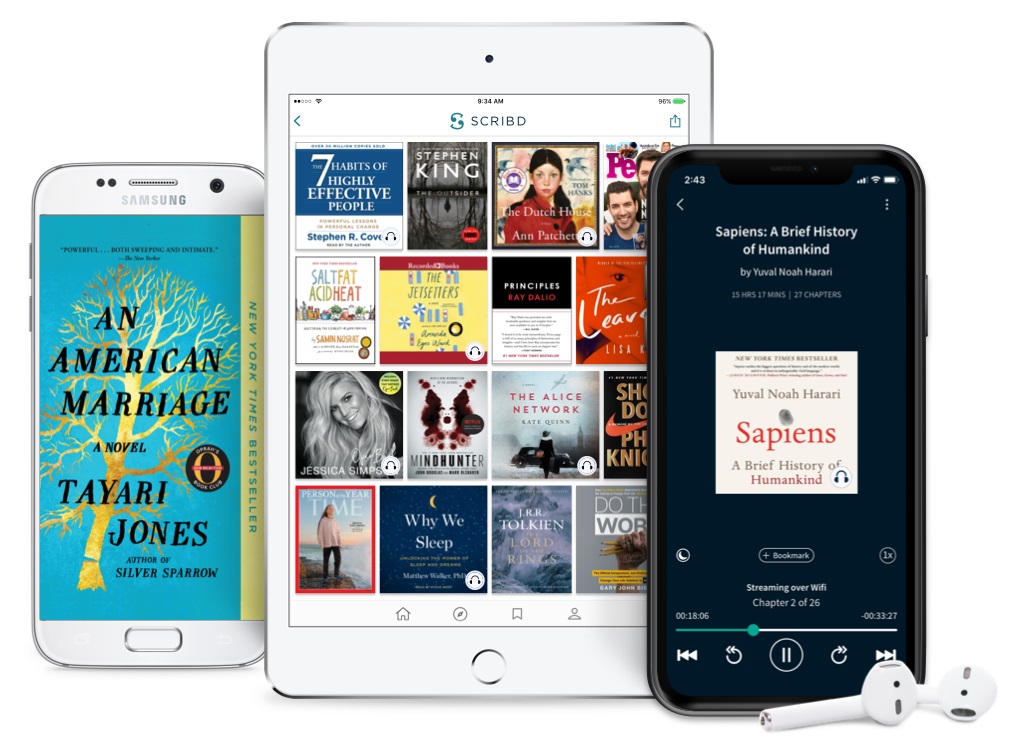 |
| |
 |
| March 24, 2020 |
| In praise of Noisli (for now) |
|
Plus: Another conference call trick, Apple's new iPads, and a big list of free stuff
|
| |
 |
|
This week, I’d like to offer some cautious praise for an app that helps me stay focused.
That would be Noisli, a noise generator app that’s been keeping me calm and concentrated while the kids are off from school. When it’s not my turn to play teacher, I retreat to my office, pop in my wireless earbuds, and turn on a custom mix of coffee shop ambiance, fireplace crackles, and brown noise. Whatever screaming or whining might be happening in the background fades away.
For nearly three years, Noisli has looked as if its developers had abandoned it. The iOS and Android apps haven't been updated since 2017, and on the iPhone X and newer, black bars run across the top and bottom of the screen due to a lack of software optimization. Meanwhile, the Android version automatically turns off after a while unless you head into Android's battery optimization settings and turn off optimization for Noisli.
Despite those issues, I continued to be a happy Noisli user because at its core, the app worked better than any other background noise app that I've tried. The quality of the sounds are excellent, the large icons and volume sliders are easy to understand and control, and if you create a Noisli account, you can synchronize mixes across iOS, Android, and the web. The mobile apps also work offline, while the web version includes a simple text editor for distraction-free writing.
Initially, this write-up was going to be different. I wanted to write a piece about how old, abandoned, and mildly janky apps are sometimes the ones we cherish most.
This week, however, I checked into Noisli's website and noticed a change: For the first time in years, it has a new design, and what used to be free has now become freemium. Using Noisli's website for more than 1.5 hours per day now requires a paid subscription, at $12 per month or $120 per year. (The subscription also adds more sounds and other features, such as advanced break timers and a shuffle mode for noise playlists.) The mobile apps haven't changed, and there are no time limits on using them, but the developers say updates are on the roadmap.
For me, the news is bittersweet. I'm glad to Noisli is showing signs of life again, and I'm obviously not opposed in principle to subscription services, especially from independent makers that have ongoing development costs. I've seen users go ballistic when an app they enjoy adopts subscription pricing (see: Fantastical, Pocket Casts) and can't get on board with that kind of outrage. Instead, I'll wait and see whether Noisli adds any restrictions to its current mobile apps (which, unlike the website, cost $2 apiece) and then decide whether to keep using them.
As for folks who haven't tried Noisli yet (presumably, that's most of you), don't rule it out just because of the looming subscription costs. An hour and a half of background noise might still be all you need in a given day, and if you enjoy using it, a couple bucks isn't a lot to gamble on the still-unlimited mobile apps. While I'll be upset if those apps get time limits in the future, the value of a little extra serenity in this current moment is priceless.
|
 |
| Tip of the moment |
 |
|
After sending out last week's list of video chat tips, I found one more worth sharing: With an app called Krisp, you can cancel out background noise from conference calls, both from your end of the call and from other meeting participants. Krisp uses on-device audio processing to remove noise—it's not doing anything unsavory, like sending audio to remote servers—and in my experience it works really well. It's available for Windows, Mac, and iOS.
Although Krisp used to require a monthly subscription, it recently started offering a free tier with 60 minutes per week of noise cancellation, and it's increased that limit to 120 minutes per week as a response to the coronavirus. Unlimited "Pro" access costs $5 per month or $40 per year, but students, teachers, government employees, and hospital workers can get this service free for six months. (On iOS, the limit is 240 minutes per week even with a paid plan.)
Once you've installed Krisp, you'll have to open up your conference call app of choice and set "Krisp" as the audio source for both input and output, but the app includes handy video walkthroughs for major services like Zoom and Slack. You can also manually turn on Krisp for any audio source through your taskbar.
|
 |
| Need to know |
|
iPads embrace the trackpad: Amid all the coronavirus anxiety, Apple’s announcement of new iPad Pros last week was kind of refreshing—a reminder, perhaps, that we can a still have fun talking about gadgets.
The new 11-inch and 12.9-inch iPad Pros both have faster processors, dual-lens rear cameras, and a depth-sensing LiDAR scanner to improve augmented reality applications. But the real news is an optional "Magic Keyboard" accessory, which snaps onto the iPad and provides both a keyboard and a trackpad. Yes, that means iPads support cursor controls now, so you can navigate through apps, manipulate text, and make the kind of fine-grained selections that are trickier to accomplish on a touch screen.
|
 |
|
Apple is charging $800 and up for the smaller iPad Pro and $1,000 and up for the larger one, plus $300 or $350 for the smaller and larger keyboards, respectively. That's a tall order, but implicit in Apple’s asking price is a statement of confidence about the iPad's ability to replace your laptop.
The good news is that you don’t have to spend that much cash to find out how trackpad support works. With the launch of iOS 13.4 later today, you can use any recent iPad with practically any mouse, either over Bluetooth or over USB (if you have the proper adapters). I look forward to sharing my impressions next week, after I’ve given mouse support a spin.
The new MacBook Air: In other Apple news, last week's rumor of an upgraded MacBook Air proved accurate, as Apple has launched a new model with a long-awaited keyboard overhaul. Confusingly, Apple is using the same "Magic Keyboard" branding in the new Air, which now uses a scissor mechanism instead of the previous butterfly key switches. The new keyboard should feel much more responsive than the old one, and it should eliminate the reliability issues that have been dogging MacBook keyboards for years.
There are a couple other notable differences from last year's model as well: The new MacBook Air upgrades to Intel's 10th-gen Core processors, which should provide modest performance and graphics boosts, and base storage is doubled to 256 GB. The entry-level model with a Core i3 processor costs $999, while a $1299 model has an i5 processor and 512 GB of storage. The only question now is whether it will routinely go on sale, as other MacBooks have over the past few years.
Coronavirus scams and hoaxes: Perhaps this should come as no surprise, but unscrupulous entities have been exploiting the coronavirus crisis with phishing scams and malware. As Ars Technica notes, a wave of fake emails have been going around, purportedly from universities and the World Health Organization. Users who click on the links in these emails may be prompted to log into their online accounts or turn over sensitive information, thereby opening them up to hacking and identity theft. The FCC has also been warning of scam texts and robocalls promoting free testing kits, bogus cures, and offers for health insurance.
While it's easy enough to disregard emails you don't trust, the amount of bad information spreading through personal messages is even more disconcerting. As the Washington Post reports, text messaging apps and email chains have become a hotbed for false information, including claims of an imminent national quarantine and rumors that New York City might shut down its bridges and tunnels. I've seen this in action myself, with friends and family members spreading rumors that are easily disproven with a Google search. I know these are crazy times, but if you hear something that sounds far-fetched, do a little digging first instead of reflexively passing it on.
|
|
|
| |
 |
| Spend wisely |
 |
|
In lieu of linking to device deals this week, I've compiled a list of free stuff to enjoy:
Wellness: The meditation app Headspace has free premium service for healthcare professionals through the end of the year. Simple Habit and Balance are offering their meditation services free to anyone if you email them. Gold's Gym is offering free app-based workouts through May 31 with the code FIT60, and Planet Fitness is streaming daily workouts. Fitbit is also offering 90 days of its premium service for free.
Learning: 450 Ivy League courses are available online for free. Milk Street Cooking School has a bunch of cooking courses for free through April 30.
Reading: Amazon is offering two free months of Kindle Unlimited and two free months of Comixology. You can also get magazines, e-books, and audiobooks from Scribd free for 30 days without a credit card. Glenn Fleishman has a free e-book on how to work from home, and for the kids, a whole bunch of Sesame Street e-books are available for free on various platforms.
Gaming: The online game store GOG has a collection of free games to download through March 30, including the classic Beneath a Steel Sky. The mobile games Alto's Odyssey and Alto's Adventure are free today only.
Viewing: My latest Cord Cutter Weekly has a list of free streaming promotions. Also, relax with some webcams from the National Aquarium or the San Diego Zoo, or watch old games from the NFL, NHL, and NBA.
|
 |
| Thanks for your support! |
|
We're due for a live chat session this week, so come through the chat room at 2 p.m. Eastern on Friday. Use this link to join at that time, or click here to get a reminder beforehand.
Stay safe out there folks, and let me know if you have any questions, comments, or feedback on how to improve this newsletter.
Until next week,
Jared
|
 |
 |
|
|
 |
|




